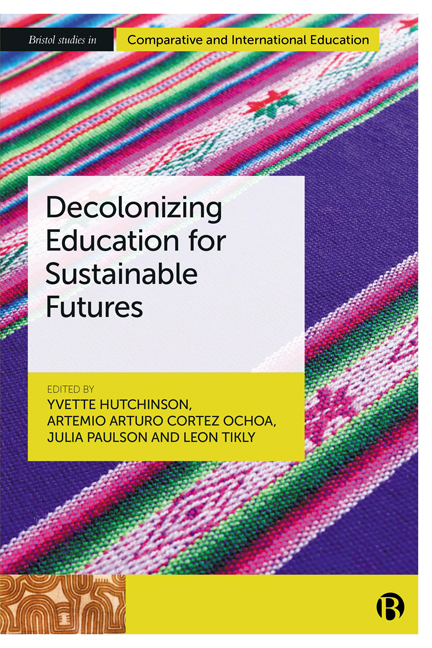Book contents
- Frontmatter
- Contents
- Series Editor Preface
- List of Figures and Table
- List of Abbreviations
- Notes on Contributors
- Acknowledgements
- Introduction
- PART I Connecting Decolonial and Sustainable Futures in Education
- PART II Decolonizing Education for Sustainable Futures: From Theory to Practice
- PART III Education’s Reparative Possibilities: Responsibilities and Reckonings for Sustainable Futures
- Conclusion
- Afterword
- Index
10 - Learning With the Past: Racism, Education and Reparative Futures
Published online by Cambridge University Press: 18 January 2024
- Frontmatter
- Contents
- Series Editor Preface
- List of Figures and Table
- List of Abbreviations
- Notes on Contributors
- Acknowledgements
- Introduction
- PART I Connecting Decolonial and Sustainable Futures in Education
- PART II Decolonizing Education for Sustainable Futures: From Theory to Practice
- PART III Education’s Reparative Possibilities: Responsibilities and Reckonings for Sustainable Futures
- Conclusion
- Afterword
- Index
Summary
Introduction
This chapter discusses the importance of historical thinking for futuresoriented policy in education. It proposes that a concept of ‘reparative futures’ can be a generative basis for knowledge and learning, not only in formal educational institutions, but in community organizations, workplaces and in all sites of cultural exchange. The idea of reparative futures signals a commitment to identify and recognize the injustices visited on, and experienced by, individuals and communities in the past. It understands that these past injustices, even when they appear to be distant in time or ‘over’, will continue to endure in people's lives in material and affective ways unless, and until, they are consciously and carefully addressed. Although there are certainly different languages and forms of reparative address, we suggest that critical practices of historical thinking can offer a vital starting point for critiquing and reformulating the interrelations of past, present and future.
The discussions focus specifically on the importance of acknowledging and seeking justice for enduring histories of racial and colonial domination. We argue that UNESCO's present programme on the futures of education needs to be underpinned by a concept of the future that is reparative if it is to challenge rather than reproduce such systems of domination. The historical thinking that we propose for this work involves the creation of educational relationships that are centred on processes of dialogue and exchange and which proceed explicitly from an anti-racist position of fundamental human equality. Such modes of education, and the radical humanism they embrace, are foundational to, and are indeed a necessary precondition for, imagining and realizing futures that are just.
Most attempts to build better futures have proceeded along different lines. In the first part of this chapter, we examine UNESCO's efforts at the end of the Second World War to identify and install through education a new ‘universal’ humanism, one that might dispense with hierarchies of ‘race thinking’. We show, however, how UNESCO's search for a new humanism rested on norms of social evolution that denied the ‘coevalness’ of others and assumed a kind of tutelary power over peoples and territories that needed to ‘catch up’ with the West (Fabian, 1983; Lorenzini, 2019).
- Type
- Chapter
- Information
- Decolonizing Education for Sustainable Futures , pp. 182 - 198Publisher: Bristol University PressPrint publication year: 2023

